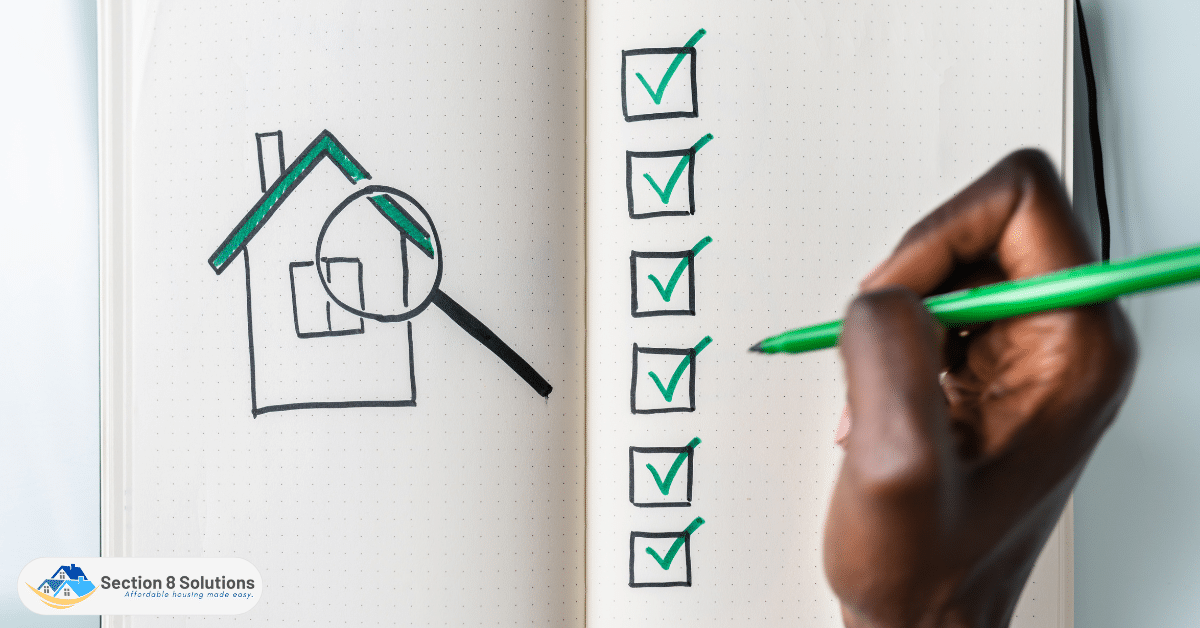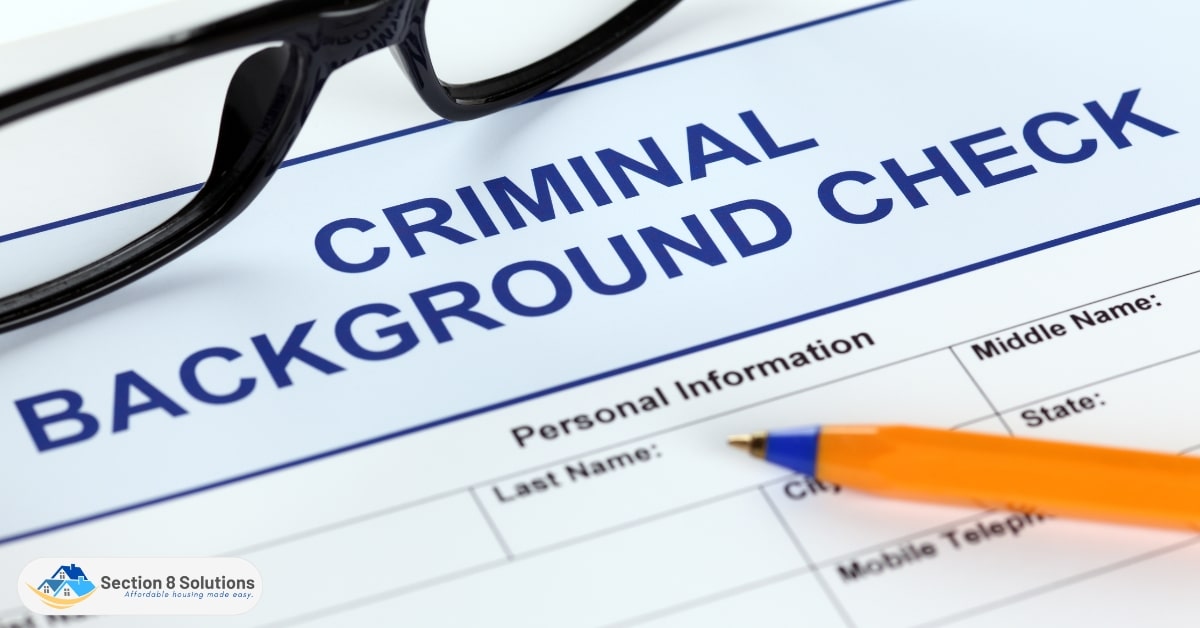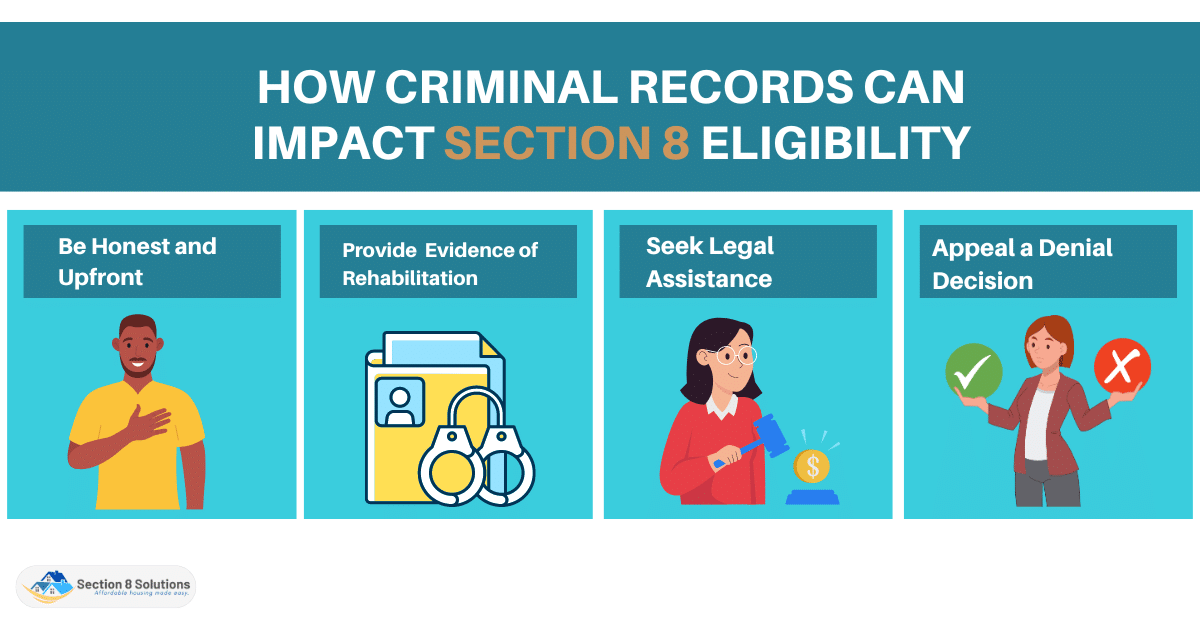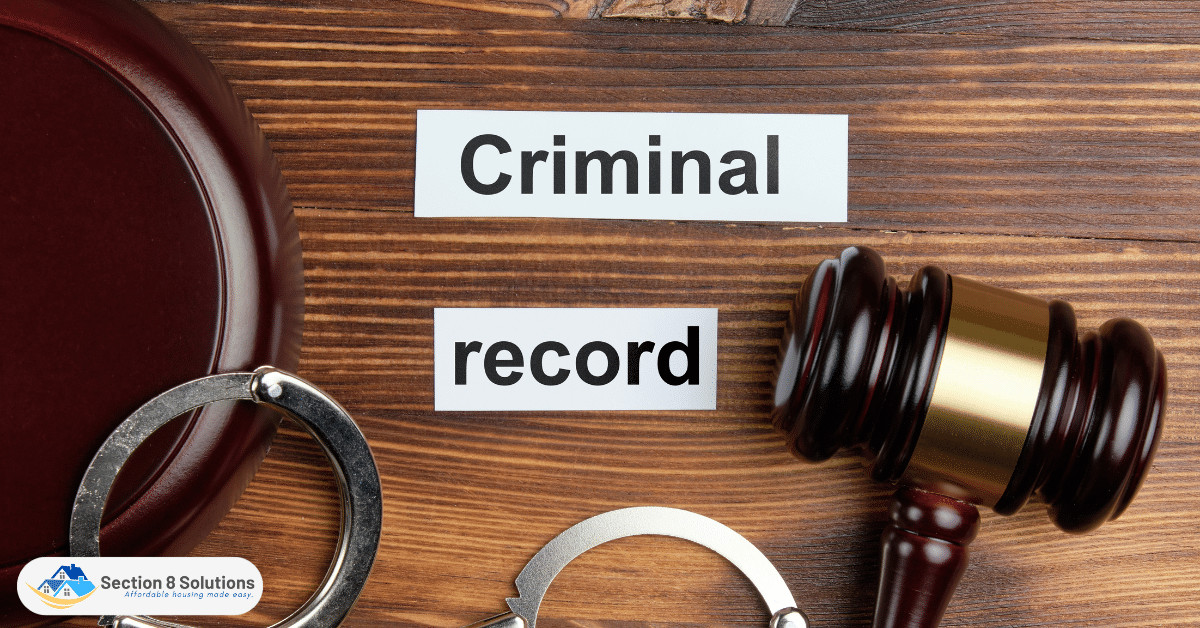Section 8 and criminal records or prior evictions can be complicated issues for both landlords and tenants. While landlords may be hesitant to rent to tenants with criminal records or prior evictions, denying a tenant’s application based solely on these factors can be seen as discriminatory and may violate fair housing laws.
This blog will explore the importance of criminal records and prior evictions in the Section 8 housing application process. We will delve into HUD’s policies regarding these issues, examine the impact of criminal records and prior evictions on Section 8 housing applications, and provide strategies for overcoming these obstacles.

Section 8 Housing
Section 8 housing, also known as the Housing Choice Voucher program, is a federally-funded program that provides rental assistance to eligible low-income families and individuals. The U.S. Department of Housing and Urban Development (HUD) administers the program and is designed to help people afford safe and decent housing.
Section 8 housing works by providing rental subsidies directly to landlords on behalf of eligible tenants. This allows families and individuals to afford housing that would otherwise be out of reach due to financial constraints. The program is an essential resource for those struggling to make ends meet and is a critical component of the nation’s efforts to address housing insecurity and homelessness.

Eligibility Requirements for Section 8 Housing
The Section 8 housing program provides rental assistance to eligible low-income families and individuals. To participate in the program, applicants must meet certain eligibility requirements.
Here are some key points to keep in mind:
- Income requirements: To be eligible for Section 8 housing, your household income must be below a certain threshold, which varies depending on your location and family size.
- Citizenship or eligible immigration status: To participate in the program, you must be a U.S. citizen or have eligible immigration status.
- Background check: Applicants must be able to pass a background check, which includes a review of criminal records and prior evictions.
- Other eligibility criteria: Other factors that may affect eligibility include household size, the composition of the household, and the availability of suitable housing in the area.
The eligibility requirements for Section 8 housing are designed to ensure that the program provides assistance to those who need it most. By understanding these requirements, applicants can determine if they are eligible to participate in the program and take the necessary steps to apply for rental assistance.

Benefits of Section 8 Housing
Section 8 housing is a program that offers a range of benefits to eligible low-income families and individuals. One of the key advantages is the provision of affordable housing, which is made possible through rental assistance. This rental assistance ensures that participants can access safe and affordable housing that would otherwise be out of reach.

Affordable Rent
When it comes to applying for Section 8 housing assistance, having a prior eviction can be a significant obstacle to overcome. Section 8 is a federal program that provides rental assistance to low-income families, seniors, and individuals with disabilities. The program is designed to help those in need obtain safe, affordable housing in the private rental market. However, eligibility for the program is determined by several factors, including an applicant’s rental history.
If you have a prior eviction on your record, it is important to be truthful in your Section 8 application. Lying on your application can result in disqualification from the program and could even lead to legal consequences. Honesty is always the best policy, and providing accurate information regarding your eviction is important.

Access to Safe and Decent Housing
The quality standards of the Section 8 program play a critical role in ensuring that rental units provided to participants are safe, healthy, and meet minimum living standards. The program requires rental units to meet specific requirements related to the condition of the rental unit and the functionality of certain features, such as plumbing, electrical systems, and heating.
The standards are designed to promote the health and well-being of participants by ensuring that the rental units they live in are free from hazards and safe to occupy. The program also sets requirements for the accessibility of units, ensuring that participants with disabilities have access to suitable housing.
The quality standards of the Section 8 program also hold landlords accountable for maintaining rental units in compliance with minimum living standards. This helps to ensure that participants receive quality housing and are not subjected to unsafe or unhealthy living conditions.

Ability to Choose Where You Live
One of the key benefits of the Section 8 program is that it provides participants with greater flexibility and choice in where they live. Unlike traditional public housing owned and operated by government agencies, the Section 8 program allows participants to rent private housing units. This means that participants have the flexibility to choose where they live, giving them greater control over their living situation. The Section 8 program plays a crucial role in providing affordable and accessible housing to low-income families and individuals.
The program provides rental assistance vouchers that enable participants to rent housing units in a wide variety of neighborhoods, including those with higher rents that may have been previously out of reach. This increased access to affordable housing allows participants to choose housing that meets their specific needs and preferences, such as proximity to employment, transportation, healthcare, and education. Participants can also choose housing based on the size and configuration of their household, which can help promote family stability and support.

Mobility
The portability feature of the Section 8 program offers participants greater flexibility and choice in where they live, which is especially critical for low-income families and individuals. When participants move to a new location, they can transfer their rental assistance vouchers to a new housing unit, without losing their eligibility or having to reapply for the program.
This feature is essential because it allows families and individuals to move to areas with better employment opportunities, access to healthcare, education, and other important resources. For example, a family that needs to relocate due to a job transfer can take their rental assistance voucher with them to a new location, ensuring they can continue to access affordable housing.
Moreover, portability helps to prevent housing instability and homelessness, which can be especially important for families and individuals who are at risk of losing their housing due to economic or personal factors. Without the portability feature, participants would have to reapply for the Section 8 program in a new location, which can take time and may result in a gap in rental assistance, leaving families and individuals vulnerable to housing insecurity and homelessness.

Prior Evictions and Section 8 Housing
Prior evictions can significantly impact the ability of low-income families and individuals to access Section 8 housing. In this section, we will explore the impact of prior evictions on Section 8 housing applications and HUD’s policies regarding this issue. We will also discuss some common situations that can lead to eviction and how they can affect eligibility for rental assistance.
- Impact of prior evictions: Prior evictions can make it difficult for applicants to qualify for Section 8 housing, as HUD considers a history of evictions as a red flag for future housing instability.
- HUD policies: HUD guides housing authorities on evaluating applicants with prior evictions, which can vary depending on the circumstances of the eviction.
- Situations that lead to eviction: Evictions can occur for many reasons, including non-payment of rent, lease violations, and changes in ownership. It’s important to understand the circumstances of the eviction and how they may impact eligibility for Section 8 housing.
Prior evictions can challenge those seeking rental assistance through Section 8 housing. However, understanding HUD’s policies and the impact of prior evictions on the application process can help applicants better prepare for the rental assistance process.

How Criminal Records Can Impact Section 8 Eligibility
When applying for Section 8 housing, criminal records can significantly impact an individual’s eligibility. Certain types of criminal records can disqualify an individual from receiving Section 8 assistance, such as felony convictions or drug-related offenses.
Felony convictions can impact eligibility because they are considered serious offenses. These can include crimes such as murder, robbery, or rape. Drug-related offenses can also impact eligibility, especially if they were committed on or near public housing property. Additionally, any offense involving fraud or violent behavior towards a landlord or housing authority employee may disqualify an individual from receiving Section 8 assistance.
The severity and recency of the offense can also impact eligibility. A recent criminal offense may indicate to the housing authority that an individual is not able to comply with lease terms or may pose a risk to other tenants. However, if the offense occurred long ago, it may be considered less relevant to the housing authority’s decision.
In some cases, a criminal record may not impact an individual’s eligibility for Section 8 housing. For example, if the offense is considered minor or non-violent, such as a traffic violation or a minor drug possession charge, it may not impact eligibility. Additionally, if an individual has completed a rehabilitation program or other measures to address their criminal behavior, they may still be considered eligible for Section 8 housing.
Overall, being upfront and honest about any criminal records is important when applying for Section 8 housing. While certain types of criminal records may impact eligibility, strategies or resources may be available to help address these concerns. Additionally, it is important to remember that each case is unique and may be evaluated on an individual basis.

How Criminal Records Can Impact Section 8 Eligibility
Being upfront and honest about any criminal records or prior evictions is essential when applying for Section 8 housing. Failure to disclose this information can result in disqualification from receiving Section 8 assistance and potentially lead to legal consequences.

Here are some tips for addressing these concerns in Section 8 applications:
- Be Honest and Upfront: One of the most important things you can do when applying for Section 8 housing is to be honest about any criminal records or prior evictions. Disclose this information in your application and explain the circumstances surrounding your situation. Being upfront and honest can show the housing authority that you are taking responsibility for your past actions and are committed to moving forward in a positive direction.
- Provide Documentation or Evidence of Rehabilitation: If you have completed a rehabilitation program, obtained a certificate of completion, or have any other documentation showing that you have made efforts to address your past behavior, be sure to include this with your application. This can demonstrate to the housing authority that you have taken steps to improve your situation and are committed to maintaining positive behavior going forward.
- Seek Legal Assistance: If you are unsure about how to address your criminal record or prior eviction in your Section 8 application, consider seeking legal assistance. An attorney or legal aid organization may be able to provide guidance on how to best present your case and can help you understand your rights under fair housing laws.
- Appeal a Denial Decision: If your application for Section 8 housing is denied due to a criminal record or prior eviction, you have the right to appeal the decision. Be sure to follow the housing authority’s appeals process and provide any additional information or documentation that may support your case.
Successful Strategies for Prior Evictions in Section 8 Applications
When applying for Section 8 housing assistance, having a prior eviction can be a barrier to qualifying for the program. However, there are no successful strategies for prior evictions in Section 8 applications that go against the ethical principles of honesty and fairness. Instead, it is important to be truthful in your application and take steps to address any underlying issues that may have led to the eviction. Seeking legal advice or assistance from housing advocacy organizations can also be helpful in navigating the Section 8 application process.
- Providing documentation of completion of a rehabilitation program, community service, or educational courses that demonstrate your commitment to turning your life around.
- Demonstrating a long period of stable housing or employment since the time of the eviction or criminal offense as can show that you have made significant strides toward improving your situation.
- Providing personal references, such as employers, case managers, or counselors, who can speak to your positive qualities and progress towards rehabilitation.
- Provide documentation to support your case if the eviction or criminal offense occurred due to extenuating circumstances, such as a natural disaster or medical emergency.
Remember, each case is unique, and additional strategies or resources may be available to help address concerns related to criminal records or prior evictions. Don’t hesitate to seek assistance or support in addressing these issues in your Section 8 application.

Conclusion
Criminal records and prior evictions can significantly impact an applicant’s eligibility for Section 8 housing. While these barriers can be challenging to overcome, understanding HUD’s policies and taking proactive steps can increase an applicant’s chances of obtaining rental assistance. Applicants need to be honest about their history and work with housing counselors and other resources to demonstrate their financial responsibility and housing stability.
We recommend that applicants with criminal records or prior evictions seek out resources such as legal aid organizations, reentry programs, and local housing authorities for assistance. By taking advantage of these resources and utilizing strategies to overcome barriers, applicants can increase their chances of accessing the benefits of Section 8 housing and achieving greater housing stability.












